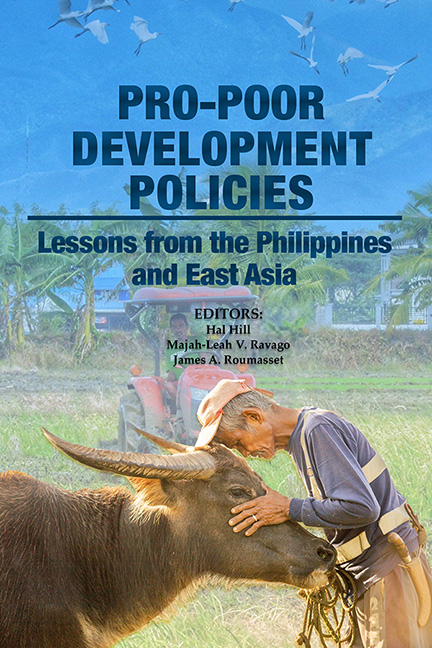Book contents
- Frontmatter
- Dedication
- Contents
- Figures, Tables and Boxes
- Foreword
- Foreword
- Message
- Preface and Acknowledgements
- About the Editors
- About the Contributors
- Acronyms
- Part 1 Introduction and Synthesis
- Part 2 Agricultural and Economic Development
- Part 3 Economic Policies for Achieving Targeted Levels of Living in the Philippines
- Part 4 Inequality and Economic Development
- Part 5 Competition Law and Policy
- Part 6 International Dimensions
- Index
1 - From Agriculture to Competition: Overview and Lessons from the Philippines and Asia for Pro-poor Development
Published online by Cambridge University Press: 09 January 2024
- Frontmatter
- Dedication
- Contents
- Figures, Tables and Boxes
- Foreword
- Foreword
- Message
- Preface and Acknowledgements
- About the Editors
- About the Contributors
- Acronyms
- Part 1 Introduction and Synthesis
- Part 2 Agricultural and Economic Development
- Part 3 Economic Policies for Achieving Targeted Levels of Living in the Philippines
- Part 4 Inequality and Economic Development
- Part 5 Competition Law and Policy
- Part 6 International Dimensions
- Index
Summary
INTRODUCTION
The Philippines has a complex development history. Initially regarded as one of Asia’s prospective stars, by 1980 it had clearly failed to live up to such a lofty expectation. It parted company with its dynamic East Asian neighbours during the 1980s, and experienced prolonged and deep twin crises, both economic and political. Popular commentary over this period labelled it “the sick man of Asia”, “the East Asian exception”, a “crony capitalist economy”, “Asia’s Latin American economy” and various other unflattering descriptors. It appeared at that time that poverty and inequality were deeply entrenched, that agriculture lacked the resilience of its neighbours, that the ethno-religious conflict in Mindanao was beyond resolution, and that macroeconomic adventurism was consigning the country to a bleak period of recurring debt crises. Many of its best and brightest citizens relocated abroad; the prospect was that the Philippines would become a “remittance economy”.
However, just as the earlier optimistic prognostications proved to be mistaken, subsequent developments have been unkind to the 1980s doomsayers. The Philippines transitioned to a workable, decentralized democracy with governments that (mostly) enjoyed electoral legitimacy. Economic reforms introduced in the wake of the 1980s’ crises resulted in economic recovery and a return to growth, which, in turn, generated significant improvements in living standards. Prior to the COVID-19 pandemic, the country had enjoyed more than 70 quarters of continuously positive economic growth. Moreover, from 2000 to 2019, its growth was not far short of those of Asia’s most dynamic economies. Viewed from the crisis decade of the 1980s, both these outcomes would have been unimaginable.
Just as this renewed prosperity appeared to be durable, the COVID-19 pandemic struck with unexpected ferocity. The Philippines experienced one of the most severe economic downturns, with its 2020 decline in gross domestic product (GDP) almost three times the global average. It introduced one of the world’s most severe lockdowns, partly in recognition of the weak capacity of the country’s under‑resourced public health system. Poverty and inequality have increased substantially as many of the poor and near-poor have been unable to sustain their livelihoods, and social protection measures have limited reach.
- Type
- Chapter
- Information
- Pro-poor Development PoliciesLessons from the Philippines and East Asia, pp. 3 - 28Publisher: ISEAS–Yusof Ishak InstitutePrint publication year: 2022



